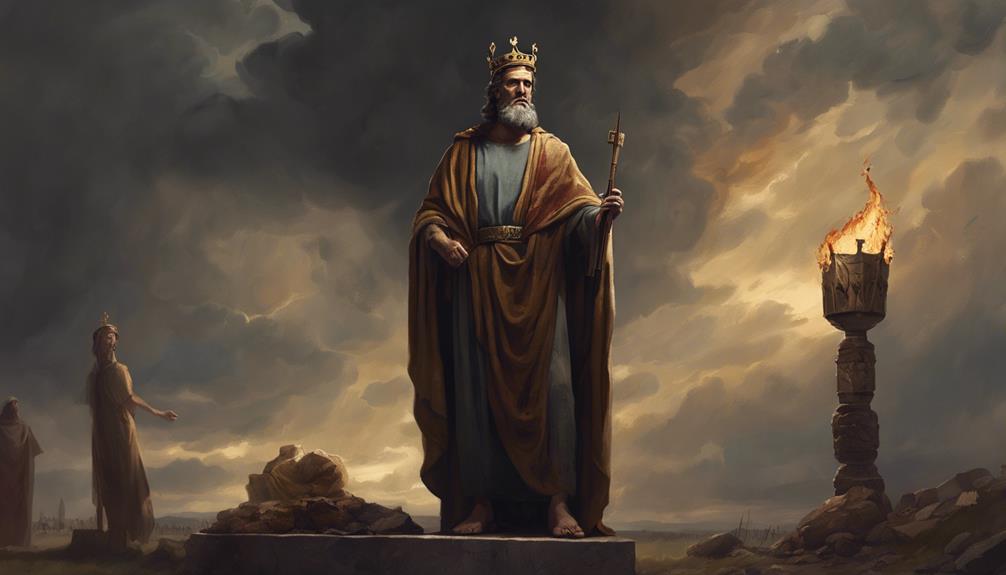Over half the Bible's stories feature defiance against divine commands, uncovering lessons in disobedience, redemption, and human-divine dynamics.

People Who Disobeyed God in the Bible
A surprising number of stories within the Bible, over 50%, involve individuals or groups making decisions that directly oppose God's commands. You might find it intriguing to explore these narratives, not just for their historical or religious significance, but to uncover the deeply human elements within.
From Adam and Eve's initial misstep in Eden to Jonah's outright refusal to fulfill his divine mission, each account offers a unique lens on disobedience and its consequences. Yet, beyond the surface of these well-known tales lies a wealth of insight into forgiveness, redemption, and the complex relationship between humanity and the divine.
Why do these stories resonate so profoundly across generations, and what can they teach us today?
Key Takeaways
- Disobedience in the Bible ranges from eating forbidden fruit to murder, showing sin's diverse impacts.
- Fear, jealousy, and personal judgment often drive biblical figures to defy God's commands.
- The consequences of disobedience include fractured relationships, violence, and divine punishment.
- Despite disobedience, themes of forgiveness and redemption highlight God's readiness to guide back to the right path.
Adam and Eve's Original Sin

While examining the narrative of Adam and Eve in the Book of Genesis, it's crucial to note that their act of eating from the Tree of Knowledge represents the inaugural instance of human disobedience in the Bible. The story unfolds in a serene garden called Eden, where the presence of the forbidden fruit sets the stage for a pivotal moral lesson. This fruit, as dictated by divine command, was off-limits to the first humans, signifying a boundary between divine will and human autonomy.
The serpent's deceit plays a central role in this narrative, embodying the catalyst for temptation. Through cunning words, the serpent challenges the veracity of God's warning about the fatal consequences of consuming the forbidden fruit, persuading Eve to question divine authority. Consequently, Eve, followed by Adam, succumbs to the allure of gaining wisdom through disobedience, an act that signifies a deliberate defiance against God's command.
This moment of transgression marks a fundamental shift in the human-divine relationship, illustrating the complexities of free will, temptation, and the consequences of disobedience. The narrative of Adam and Eve, thus, serves as a foundational story in biblical teachings on sin and redemption, emphasizing the profound impact of their actions on subsequent human history.
Cain's Jealous Rage
Following the narrative of Adam and Eve's fall, the Bible presents the story of Cain's jealousy leading to the murder of his brother Abel, a further exploration of sin's evolution in human behavior. This tale introduces sibling rivalry as a potent source of conflict, illustrating how envy and resentment can escalate into violence. Cain and Abel's story revolves around their sacrificial offerings to God. Abel's offering, a lamb from his flock, finds favor with God, while Cain's offering, produce from the ground, does not.
This distinction in divine acceptance fuels Cain's jealousy and prompts his tragic decision to kill Abel. The Bible's depiction of this incident is analytical in its exploration of sin's consequences. It not only marks the first murder in human history but also underscores the severity of Cain's disobedience. His actions not only defy God's moral order but also fracture the foundational family unit, setting a precedent for the destructive power of sin. Cain's story serves as a cautionary tale about the dangers of allowing jealousy and anger to go unchecked, emphasizing the need for self-control and adherence to divine guidance.
Noah's Drunkenness

Transitioning from the narrative of Cain and Abel, the Bible presents another significant episode of human imperfection in the story of Noah's drunkenness, highlighting the continued exploration of sin and its repercussions. This incident isn't merely about the act of drunkenness but reveals deeper layers concerning Noah's vulnerability and the complex family dynamics that unfold as a result.
In analyzing this episode, consider the following aspects:
- Noah's Vulnerability: After surviving the flood and ensuring the continuity of human and animal life on Earth, Noah's fall into drunkenness exposes his human frailty. It's a stark reminder that even those who are righteous aren't immune to sin and its consequences.
- Family Dynamics: The reaction of Noah's sons to his condition further explores the theme of sin and its impact on family relationships. Ham's disrespect contrasts sharply with the respectful response of Shem and Japheth, illustrating how individual actions can affect familial bonds and integrity.
- Moral Lessons: This story serves as a cautionary tale about the dangers of excess and the importance of maintaining dignity and respect within the family structure, emphasizing personal responsibility and the potential fallout from lapses in judgment.
Analyzing Noah's drunkenness through these lenses provides valuable insights into human nature, the challenges of maintaining righteousness, and the complexities of interpersonal relationships.
Jonah Fleeing His Mission
Shifting focus to the narrative of Jonah, the Bible presents a profound exploration of disobedience through his attempt to escape the divine mission assigned to him. This story illuminates not only Jonah's fear but also the boundless nature of God's forgiveness. Initially, Jonah's reaction to his calling—to prophesy against the city of Nineveh—was driven by fear. His decision to flee, boarding a ship to Tarshish, directly opposed God's command, marking a deliberate act of disobedience.
Jonah's fear can be analyzed through multiple lenses. It might reflect apprehension about the reception of his message, or perhaps a deeper, existential dread of failing in his prophetic duty. Regardless, this fear led him away from obedience, steering him into the belly of a great fish—a metaphorical and literal descent precipitated by his attempt to elude divine responsibility.
This episode in Jonah's life underscores a crucial theme: disobedience, rooted in human fear, can lead one away from their divine path. Yet, the narrative arc of Jonah also highlights God's readiness to forgive and redirect those who stray. Through Jonah's eventual compliance and the subsequent mercy shown to Nineveh, the story reaffirms the transformative power of repentance and divine grace, presenting a compelling dialogue on human fallibility juxtaposed with divine compassion.
King Saul's Disobedience

Exploring further instances of biblical disobedience, we encounter the story of King Saul, whose actions serve as a stark illustration of the consequences that follow when divine directives are ignored. Saul's journey, marked by a series of grave missteps, showcases a decline that offers valuable lessons on obedience and humility.
- Initial Disobedience: Saul's journey into disobedience began with his failure to wait for the prophet Samuel before making a sacrifice, an act that directly contravened God's command. This impatience reflected a deeper issue of trust and obedience, setting the stage for his eventual downfall.
- Incomplete Obedience: Another pivotal moment was Saul's decision to spare King Agag and the best of the spoils during the Amalekite conquest, disregarding God's explicit instructions for total destruction. This act of partial obedience highlighted Saul's inclination to prioritize personal judgment over divine command, leading to his rejection as king.
- Witch Consultation: In a moment of desperation, Saul sought guidance from a witch in Endor, further straying from God's path. This witch consultation, coupled with Saul's regret, underscores the extent of his spiritual decline, ultimately sealing his fate and serving as a cautionary tale on the perils of disobedience.
Frequently Asked Questions
How Did the Acts of Disobedience by These Individuals Influence the Development of Moral Teachings in Abrahamic Religions?
You're exploring how acts of disobedience have shaped moral teachings in Abrahamic religions. These actions often led to divine punishment, highlighting the consequences of straying from religious laws.
This, in turn, created a framework for understanding right and wrong, injecting a sense of moral ambiguity into religious narratives. Such stories serve as cautionary tales, emphasizing the importance of adherence to divine commands and influencing the development of moral principles within these faiths.
Are There Instances Where Those Who Disobeyed God in the Bible Were Later Redeemed or Forgiven, and What Does This Say About the Concept of Forgiveness in These Religious Texts?
You're exploring whether individuals who went against divine commands were later pardoned, highlighting the notion of forgiveness.
This journey reveals that yes, many were forgiven, underscoring a key message: divine punishment isn't the end.
It points to a profound understanding of human nature within these texts, recognizing that error is part of the human condition and forgiveness is essential.
This perspective enriches our grasp of moral development and the complexity of divine-human relationships.
How Do Modern Interpretations of These Biblical Stories Vary Across Different Christian Denominations or Other Abrahamic Faiths?
You'll find that modern interpretations of biblical stories vary widely across Christian denominations and other Abrahamic faiths. These differences often stem from cultural interpretations and concerns about historical accuracy.
For example, some may emphasize the moral lessons of a story, while others might focus on its literal historical context. This diversity reflects the rich tapestry of beliefs and emphasizes how each group understands and relates to these ancient texts in a contemporary world.
In What Ways Have These Stories of Disobedience Been Utilized Outside of Religious Contexts, Such as in Literature, Art, or Psychology?
You'll find that stories of disobedience have been woven into various non-religious fields, serving as literary archetypes and subjects for psychological analysis. They've inspired countless works in literature and art, offering a rich tapestry for exploring themes of rebellion, morality, and the human condition.
Psychologists have also utilized these narratives, examining the motivations behind disobedience and its implications on human behavior, thus broadening our understanding of these timeless tales.
How Do These Acts of Disobedience Compare and Contrast With Stories of Obedience in the Bible, and What Lessons Are Typically Drawn From These Comparisons?
You're exploring how acts of disobedience contrast with obedience narratives, focusing on the comparative outcomes and moral dichotomies. This analysis often reveals a broad spectrum of lessons, from the virtues of faith and loyalty to the consequences of defiance.
Conclusion
In the tapestry of biblical narratives, individuals who defied God's commands act as dark threads, contrasting sharply with the fabric of divine will. Adam and Eve's fall from grace, Cain's murderous envy, Noah's lapse into inebriation, Jonah's attempt to flee his destiny, and King Saul's rebellion symbolize the enduring human struggle against the divine directive.
These stories collectively serve as a somber reflection on the consequences of disobedience, reminding us of the intrinsic battle between human frailty and the pursuit of righteousness.



Sign up